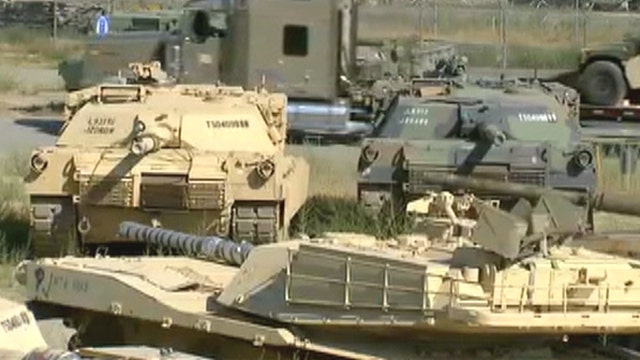Military surplus sale: Unloading unused war equipment
William La Jeunesse reports from Herlong, California
It could be Uncle Sam’s biggest yard sale.
After 12 years of war in Afghanistan, officials are now pondering what to do with $50 billion in equipment half a world away — including combat vehicles, dining rooms, gyms, clothing and more.
“A lot of this stuff, you're not really concerned about bringing it back,” said Jim Hasik, a senior fellow at the Atlantic Council. “I mean if a Coke machine falls into the hands of the Taliban, this is just not a big disaster.”
But eventually, much of the gear will trickle down to the public. With the click of a mouse the spoils of war can be yours on govliquidation.com. Each day, new items appear on the site – as bases around the country release unneeded items – from rafts and trucks, to fire engines and pretzel stands.
But first, the massive effort to bring some of the equipment home. By December 2014, the U.S. military will have transported home some 35,000 vehicles and 95,000 containers at an estimated cost of $6 billion. It is the largest retrograde or pullout in history.
“There are huge problems getting materiel out of Afghanistan,” said Don Olson, top civilian leader of the Sierra Army Depot, America’s largest repository of military equipment.
The biggest problem, since Afghanistan is landlocked, is that the U.S. must fly the equipment out or pay exorbitant customs fees to Afghanistan and Pakistan. The cost of moving the containers alone could reach $237 million, officials estimate.
“At some point, actually it becomes more sensible to destroy that equipment in place than to actually bring it back,” said Hasik.
That’s exactly what the Pentagon is doing with some 2,000 of the massive eight-ton troop carriers known as MRAPS. Each MRAP cost taxpayers more than $1 million, but with 24,000 already in the Army inventory, officials decided it was more cost effective to scrap 2,000 of the vehicles in Afghanistan rather than bring them home.
“Did we overbuild, did we overbuy on the MRAP? Almost certainly,”said Hasik, who is also quick to say it was impossible to know just how many of the armored vehicles were necessary. The MRAP is credited with protecting many American lives against roadside bombs.
Many that did come home are parked at the Sierra Army Depot, 35,000 acres of steel and high desert scrub in California. The depot is home to tens of thousands of combat vehicles and more than $1 billion in clothing.
“We provide that catcher’s mitt for the Army, for the nation,” says Olsen. “They send that equipment here. We manage it until the Army can make a decision of what to do with it in the future.”
Most battle tanks remain here, and replenish U.S. stocks. Some personnel carriers are sold to allies. Clothing is recycled and reused.
The base has its own rail yard and airstrip and trucks arrive daily. Some 1,500 employees, all part of the Army Materiel Command, identify, sort and store each item that comes in.
“Where it goes next depends on where it is needed,” said Olson.












































